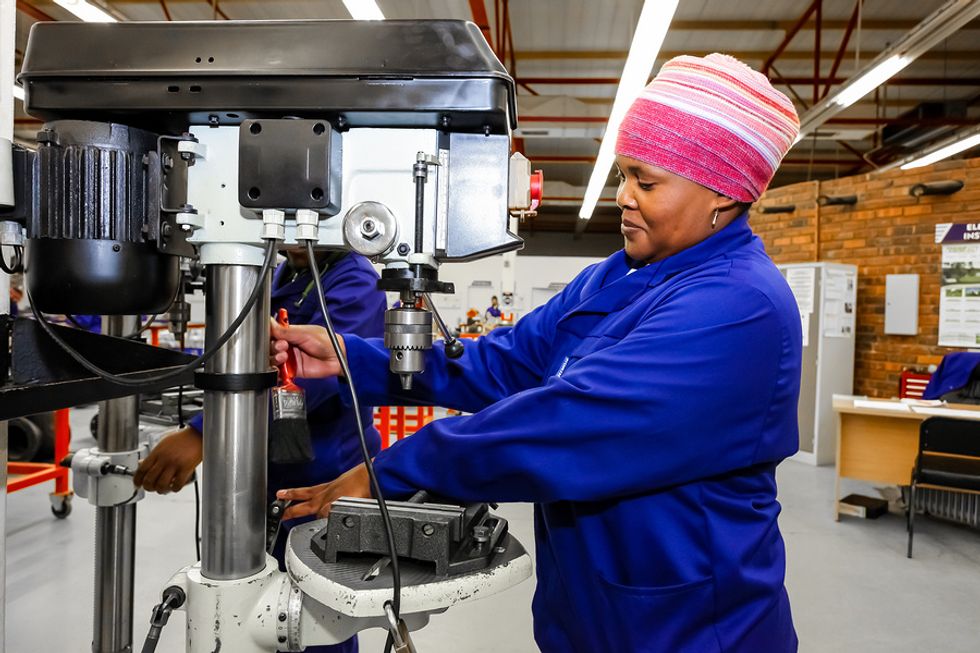
Landing your first job right out of school can be tricky. What if you can’t find something that you think you would enjoy and is in alignment with your degree? What if time starts to run out and you need a job, like right now?
Often, new graduates will settle for something that is outside of their field of study or something that doesn’t even require their level of education because they are just looking for a jobâ¦and at some point in the search, any job starts to look pretty good.
My caution, however, is to stay true to what it is you truly want to do instead of defaulting too quickly to whatever is available. Life has a funny way of leading you in a certain direction based on the seemingly innocuous decisions you make on any given day or at any point in time.
The decisions you make right after graduating college, however, can set you on a course that will either serve you in unexpectedly delightful ways or will set you on a course that will not serve you in the long run at all.
Why Your First Job Matters

Recently, I spoke with a young woman who is 25 years old. She has a degree in communications and PR, but she said that while she was still in school, she had decided that she hated everything about PR.
It was “too late to change [her] major,” she said, so she stuck with it. Now, as a relatively recent graduate, she has a degree that is useless to her because she hates what the degree says she can do.
Between the time she graduated and now, she has been working as an administrative assistant, and she didn’t like that either, so she quit.
When I asked her what she was going to do next, she indicated that she was thinking of getting her license as a realtor. In the meantime, she would be taking over some extra shift work at her second job, and she would probably do some odd jobs to pay the rent and her other expenses until she settles on something.
I didn’t get the impression that this smart young woman had any real idea of what she wanted to do. She did say she wanted to do something “meaningful,” and I don’t know where getting her realtor’s license fits in with that, but perhaps she truly has a passion for helping people buy homes that wasn’t readily apparent during our conversation.
The thing that was apparent to me is that she is adrift with no real sense of direction or purpose, and the more odd jobs and temporary gigs she takes, the more difficult it will be for a future employer to take her seriously as a candidate.
Even if she were to figure out tomorrow what she wants to do for the next few years, she would have a challenging time of it working up a resume that would get her the job unless she knew someone who was able to give her a fantastic recommendation.
The point of all of this is that you need to have some sort of plan, and you need to keep the following five things in mind before accepting your first job unless you want to be derailed before you have even gotten started.
1. Create A 5-Year Plan

Everyone at every stage of life should have a five-year plan. You don’t have to expect that everything on the plan will pan out exactly as planned but, as with anything in life, if you don’t have a plan, you are going to wind up spinning your wheels.
Benjamin Franklin said, “If you fail to plan, you are planning to fail.” So even if you aren’t sure you will be able to follow through on everything in your plan, at least create one.
Having a sense of where you want to be in five years will simplify some of the decisions you have to make now.
For example, ask yourself: “If I take this job now, will it set me on the course I need and want to be on if I stick with my five-year plan?” If the answer is “yes,” then you continue to consider taking the job. If the answer is “no,” unless there are other extenuating circumstances, you should probably turn the job down.
2. Consider The Long-Term Trajectory Starting With Your First Job

This consideration is an extension of the first one. Whatever decisions you make now concerning your career will likely have an impact on what happens to you moving forward.
My first job, for example, was one I took out of a sense of desperation. I felt tremendous pressure from my parents who wanted me to be gainfully employed so I could have health insurance. Back in those days, you had 60 days to find something or you were kicked off your parents’ plan, and you were out of luck.
This was hammered into me by my mother who worked for the state and carried the insurance plan for the family. She was determined that I would not go one day without insurance, and back then there were fewer options available than there are today. You were either insured by your employer, or you didn’t have insurance unless you had money to pay for a single-payer policy.
So, I took the first job that was offered to me even though it wasn’t with the district I wanted, and it required a 40-mile commute one way. I was lucky in that I was able to get a job with the district I wanted to work for a year later, but if that hadn’t happened, I might still be living in a rural area not far from where I grew up. Not that there is anything wrong with that, but that wasn’t what I wanted.
Know what you want and consider the consequences of settling for something less before you make a decision out of desperation.
3. Create A List Of The Pros And Cons Of Taking This Particular Job As Your First Job

I recommend that you list the reasons for taking the job, and then list the reasons not to take the job. Which list is longer? How bad are the cons? How good are the pros?
Weigh that list carefully, and let it guide you toward making the right decision.
4. Remember That It Is Your Lifeâ¦And Your Decision

Your parents, friends, and other relatives love you, and they want to see you happy and settled. Resist their efforts to rush you into making a decision, however. If you let them pressure you, and you wind up making a mistake, you will be the one who pays for it in the long run.
Resist their good intentions and listen to your own counselâyour gut or your intuitionâin making a decision about whether this job is right for you or not.
5. Ask The Right Questions Before You Take Any Job
When you are offered a job, that is not the end of the conversation; it is only the beginning.
Be prepared to ask a lot of questions before saying “yes.” You are making a momentous decision, and you can’t afford to take it lightly.
Craft a list of questions about the expectations of your employer and ask about benefits and perks. Make sure the salary is one you can live on and don’t be afraid to ask if you can negotiate some details before you say “yes.” You will appear to be less desperate and more professional to the people who are hiring you. To the extent that you can, know what you are getting into, and know that you can deal with it before accepting the offer. Also, get as much of the terms of your employment in writing as you can.
Accepting your first job right out of college is a big deal and it can make the difference between setting you on the career path you want for yourself or creating a detour from which you may never fully recover. Know as much as you can about the job before saying “yes.” You will be glad you did.
If you consider these five things before getting your first job, you’ll start your career off on the right footâand set yourself up for professional success in the career that you want. Be strategic…and don’t settle!
Need more help with your job search?
Become a member to learn how to land a job and UNLEASH your true potential to get what you want from work!
This article was originally published at an earlier date.












































